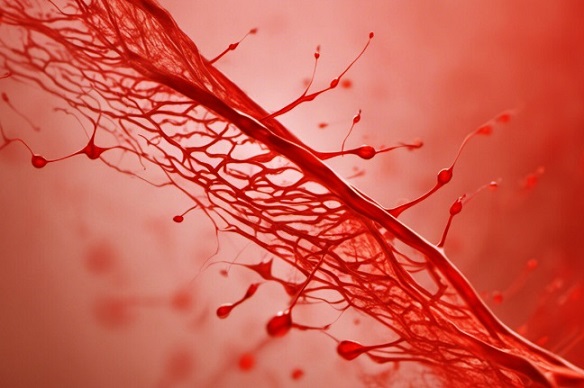Nikhil Prasad Fact checked by:Thailand Medical News Team Feb 15, 2025 1 month, 3 weeks, 5 days, 5 hours, 44 minutes ago
Medical News: A new study by researchers from Zhejiang University School of Medicine, Naval Medical University, Tongji Medical College at Huazhong University of Science & Technology, Nankai University, and the Chinese Academy of Medical Sciences has uncovered a troubling mechanism by which SARS-CoV-2, the virus responsible for COVID-19, weakens the body's natural defense systems and causes severe damage to blood vessels. This research provides crucial insights into why some patients suffer from severe complications, including blood clots and multi-organ failure.
 COVID-19 Damages Human Blood Vessels
COVID-19 Damages Human Blood Vessels
The study found that SARS-CoV-2 enhances the body’s complement system response, a key part of the immune system responsible for fighting infections. However, instead of helping the body fight the virus, this immune response goes into overdrive, attacking the body’s own cells. This
Medical News report explains how SARS-CoV-2 suppresses important proteins known as complement regulatory proteins (CRPs), leading to widespread blood vessel damage and life-threatening conditions.
How the Virus Triggers Blood Vessel Damage
The complement system is an essential part of the body’s defense against infections, helping to clear pathogens by marking them for destruction. However, to prevent damage to healthy tissues, the body has built-in regulatory proteins such as CD46, CD55, and CD59 that control complement activation. The study found that multiple SARS-CoV-2 proteins, including the M, NSP16, and ORF9b proteins, suppress these protective proteins, making endothelial cells (which line the blood vessels) more vulnerable to immune system attacks.
Using CRISPR/Cas9 screening, the researchers identified three key regulators of CD59 - ADAMTS9, SYAP1, and HIGD1A - which were found to be inhibited by SARS-CoV-2 proteins. This suppression of CD59 allows the immune system to destroy endothelial cells, leading to a condition called thrombotic microangiopathy, where small blood vessels become blocked, reducing oxygen supply to vital organs.
Increased Complement Activation in COVID 19 Patients
The researchers further examined lung tissues from patients who died of severe COVID-19 and compared them to lung samples from non-COVID-19 patients. They found that COVID-19 patients had significantly higher levels of complement proteins such as C5b-9, which is responsible for forming pores in cell membranes, causing cell death. Additionally, the researchers detected increased deposits of complement recognition components such as FCN1, further indicating that the virus enhances complement activation.
This finding explains why severe COVID-19 patients often develop blood clot-related complications, as the excessive immune response damages blood vessel walls, making them prone to clotting. This process contributes to organ damage in the lungs, kidneys, and even the brain, leading to severe outcomes in infected individuals.
The Role of Interferons in Regulating the Complement System
Interferons, a type of
immune system signaling protein, play a crucial role in regulating complement activity. The study found that IFN-γ, a type of interferon, helps counteract the suppressive effects of SARS-CoV-2 proteins on CRPs. However, in many severe COVID-19 patients, interferon responses are delayed or weakened, leading to unchecked complement activation and blood vessel damage.
The researchers demonstrated that IFN-γ and GM-CSF could restore some levels of CD55 and CD59, potentially offering a protective effect against immune-mediated blood vessel damage. This suggests that boosting interferon responses might be a possible therapeutic approach to mitigate severe COVID-19 complications.
Potential Therapeutic Targets for COVID 19
Given the study’s findings, targeting complement activation could be a promising strategy to reduce severe COVID-19 complications. Several existing drugs, such as C1 inhibitors, eculizumab (a C5 inhibitor), and AMY-101 (a C3 inhibitor), have already shown promise in reducing the severity of complement-mediated damage in COVID-19 patients. However, researchers caution that these treatments must be carefully administered to avoid unintended side effects, such as making patients more susceptible to bacterial infections.
Furthermore, restoring the levels of CD55 and CD59 through targeted therapies may help protect blood vessels from immune system attacks. Developing treatments that enhance the function of ADAMTS9, SYAP1, and HIGD1A could also provide new avenues for preventing endothelial injury caused by SARS-CoV-2.
Conclusion
This study sheds light on a critical mechanism by which SARS-CoV-2 disrupts the body’s ability to regulate the immune response, leading to severe endothelial injury and life-threatening complications. By suppressing complement regulatory proteins, the virus turns the body’s immune defense against itself, damaging blood vessels and increasing the risk of organ failure.
These findings emphasize the importance of early interventions to regulate the immune response in COVID-19 patients. Future research should explore therapies that restore complement regulatory function and investigate how boosting interferon responses might help prevent severe disease outcomes.
The study findings were published in the peer reviewed journal: Emerging Microbes & Infections
https://www.tandfonline.com/doi/full/10.1080/22221751.2025.2467781
For the latest COVID-19 News keep on logging to Thailand
Medical News
Read Also:
https://www.thailandmedical.news/news/polish-study-finds-that-covid-19-stiffens-blood-vessel-cells-and-disrupts-their-structure
https://www.thailandmedical.news/news/neutrophil-adhesion-to-blood-vessels-walls-impairs-pulmonary-circulation-in-covid-19
https://www.thailandmedical.news/news/indonesian-doctors-warn-that-sars-cov-2-and-hsv-1-can-trigger-behcet-s-disease-involving-blood-vessel-inflammation
https://www.thailandmedical.news/news/covid-19-causes-remodeling-of-the-pulmonary-vasculature
https://www.thailandmedical.news/articles/coronavirus
https://www.thailandmedical.news/pages/thailand_doctors_listings
https://www.thailandmedical.news/pages/thailand_hospital_listings
Follow us on:
https://x.com/ThailandMedicaX
https://www.facebook.com/ThailandMedicalNews
https://bsky.app/profile/thailandmedical.bsky.social
https://gettr.com/user/thailandmedicalnews
https://www.tribel.com/thailandmedical/wall
and 33 other social media platforms
